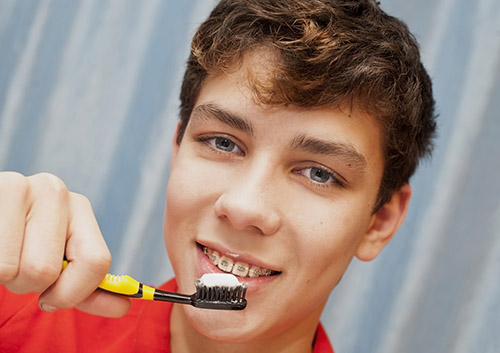June 14th, 2023

Modern dentistry has made the most of today’s technological innovations. And we’ve come a long way from the fraying sticks our ancestors used as toothbrushes.
On the other hand, while it’s a lot better than a fraying stick, the manual toothbrush model you’ve used for years might be ready for an upgrade. Should you take this opportunity to try out some new technology offering all the bells and whistles? Let’s answer that question by asking a few more questions.
Happy with your manual brush?
If you like your manual toothbrush and it’s doing the job, by all means, stick with it. But even your old familiar brush can evolve:
- There are lots of bristle options, but soft bristles are almost always the way to go. Medium and hard bristles can be too abrasive for your enamel.
- Heads come in a variety of sizes, so make sure the head size is comfortable. You want to be able to maneuver to reach every tooth surface, which a too-large brush head just can’t do.
- Try a different handle shape if you’re having trouble maneuvering and keeping a firm grip.
- Change your brush regularly. Brushes are effective for about three months before the bristles start to fray and breakdown. This is a good opportunity to experiment with different brands and styles.
Does your old brush suit your current needs?
Different types of manual toothbrushes are available for effective and comfortable brushing when you need options that a typical brush doesn’t provide:
- Special orthodontic toothbrushes are designed with bristles trimmed to fit around brackets and wires and smaller heads to reach into tight places.
- For those with mobility issues, brushes with larger or easy-grip handles make cleaning more comfortable.
- Brushes with extra-soft bristles are available if you have enamel erosion or sensitive gums.
- Because many women find their gums become especially sensitive during pregnancy, there are brushes designed especially for moms-to-be.
Is it time to go electric?
If you haven’t tried an electric toothbrush before, you might find that getting braces is a great reason to give one a spin.
- Electric toothbrushes can outperform manual models. A dedicated brusher might manage hundreds of brushstrokes for each minute of brushing, while an electric brush can provide thousands. If, despite your regular brushing, you have plaque build-up, an electric brush might be a good alternative to your manual brush.
- Models are available which can alert you when you’re brushing too hard—which is important for your enamel if you’re a heavy-handed brusher.
- If you tend to *think* you’ve brushed for the recommended two minutes, but have *actually* brushed 32 seconds, some electric brushes come with timers!
- There are tapered electric orthodontic brush heads designed just for people with braces.
- Electric brushes have bigger handles and can be easier to grip.
Is your current brush doing the job?
So, should you stick with the familiar toothbrush that’s worked for you all these years, or take this opportunity to try out some new technology that offers all the bells and whistles? The answer is clear: the right brush for you is the one that works!
If your regular checkups show that plaque is under control, you’re doing just fine with the brush in hand. If you or Dr. Theodotou notice plaque buildup, it’s time to consider making some changes. Whether it’s a question of tools, techniques, or time spent brushing, your Pooler dental team has the answers you need for state-of-the-art dental hygiene.
June 7th, 2023

When a child is born, he or she will have 20 primary teeth and 32 permanent teeth. But sometimes kids are born with additional teeth, and our team at Oral and Maxillofacial Surgery of Coastal Georgia calls this oral condition "hyperdontia." Primary teeth are the first set of teeth that erupt in your child's mouth, typically by the time they are 36 months old, and are shed by the time your child reaches the age of 12. Permanent teeth then take the place of the primary teeth and are usually fully-erupted by the time your son or daughter reaches 21 years of age. Anyone who develops more than 20 primary teeth or more than 32 permanent teeth has hyperdontia, and the additional teeth are referred to as supernumerary teeth.
While the cause of hyperdontia is not entirely clear, it is believed that there may be a genetic factor. Oral professionals have found that patients with extra teeth often have syndromes like cleidocranial dysplasia, Ehler-Danlos syndrome, Gardner syndrome, or cleft lip and palate. The prevalence of hyperdontia affects between one and four percent of the population in the United States, and the majority of cases are limited to a single tooth.
So, what is the best way to deal with hyperdontia? It really depends on the case. The treatment plan your doctor suggests varies according to the potential problem posed by the supernumerary teeth, as well as their type. Orthodontic treatment may certainly may help, but extraction can also be a good option. We recommend that children receive an oral evaluation or checkup no later than the age of seven. In addition to hygiene evaluation, this helps ensure your child does not experience hyperdontia problems.
If you suspect you or your child may be suffering from hyperdontia, please give us a call to schedule an appointment at our convenient Pooler office to be evaluated.
June 7th, 2023

If you have been thinking about getting a piercing, or if you already have one or more, there are some health risks our team at Oral and Maxillofacial Surgery of Coastal Georgia wants you to know about. It's important to know the risks involved with oral piercing, including infection, chipped teeth, gum damage, nerve damage, loss of taste, or tooth loss that could occur as a result.
Your mouth contains millions of bacteria, and infection is a common complication of oral piercing. Many people who have piercings tend to regularly touch them, paving the way for bacteria to enter piercing sites. Also, food particles that collect around piercing sites can lead to infection.
Besides hindering your ability to talk and eat, oral piercing also leads people to develop a habit of biting or playing with their piercings, which can lead to cracked or fractured teeth. While the fracture can be confined to the enamel of the tooth and require a simple filling, you also run the risk of the fracture going deep into the tooth, which may require a root canal, tooth extraction, and additional dental treatment.
If you still decide to get an oral piercing, you should realize that it will take some time to heal (anywhere between four to six weeks) and it may be very uncomfortable. Also please keep in mind that it will be an added responsibility to your life, as it will require regular upkeep. We want you to make sure that you’re committed to the task of taking care of it for the full healing period and beyond.
We encourage you to clean the piercing with antiseptic mouthwash after eating, and brush the jewelry each time you brush your teeth. If you have any questions, please don't hesitate to give us a call!
May 31st, 2023

Our pets are a valued part of the family, but dogs and cats are not regularly known for their minty-fresh breath. Did you know that bad breath can be a sign of a more serious dental problem for your furry companion?
If you live with a pet or two, you’ll want to brush up on your animal dental knowledge and make sure everyone’s teeth stay healthy.
Proper dental care is essential to a pet’s overall well-being. About 80 percent of dogs and 70 percent of cats suffer from periodontal disease after the age of three.
Not only is this unhealthy for their mouth, it can lead to more serious health problems, including organ damage and heart failure. Toxins from periodontal disease seep into your pet’s bloodstream and have the potential to cause fatal organ damage.
Your veterinarian will check your pet’s teeth at an annual or six-month examination, but here are a few signs of periodontal disease you should watch for at home:
- Yellow/brown tartar
- Foul breath
- Red, inflamed, or bleeding gums
- Excessive drooling
- Pawing at the mouth or rubbing one’s jaw against objects
- Difficulty chewing
Aside from regular checkups at the vet, the best thing you can do for your pet is brush its teeth daily. Bacteria can recolonize onto the surface of teeth within 24 to 36 hours, so it’s essential to remove plaque before it turns into tartar. Ask your vet for a recommended toothbrush and pet toothpaste.
Dental hygiene chews can also help to reduce the effects of gingivitis, but some chews can actually make your pet’s oral health worse. Treats such as cow hooves, pig’s ears, and animal bones can damage teeth and cause other problems if ingested. Your vet can help you choose items that are healthiest for your pet.
Your dog’s favorite toys may also pose a threat to their oral health. Abrasive toys such as the popular green tennis balls can create wear and tear on the surface of pets’ teeth.
As with your own teeth, your dog or cat’s oral health plays a large role in its overall health. Remember to schedule regular checkups and ask your veterinarian for more tips on how to care for your pet’s teeth most effectively.






 Website Powered by Sesame 24-7™
Website Powered by Sesame 24-7™